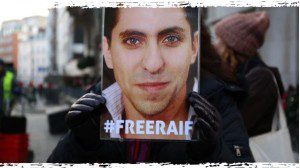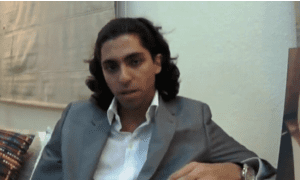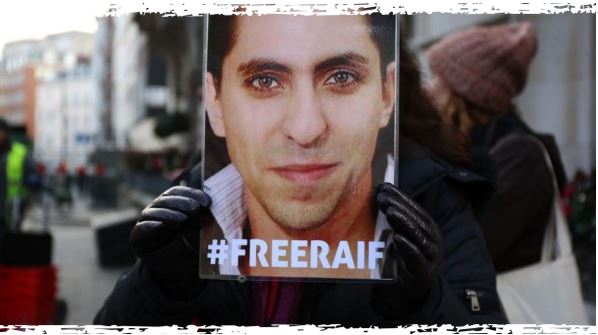Index relies entirely on the support of donors and readers to do its work.
Help us keep amplifying censored voices today.
[vc_row][vc_column][vc_single_image image=”107402″ img_size=”full” add_caption=”yes”][vc_column_text]On 17 June 2012, blogger Raif Badawi was arrested in Saudi Arabia for “criticising Islam through electronic means” and for apostasy (the abandonment of Islam by a Muslim). He was convicted and sentenced to seven years in prison and 600 lashes, which was later extended to 10 years and 1,000 lashes. Seven years later, his imprisonment continues to spark outrage around the world.
“I think it’s important to show to the Saudi Arabian government that we’re still highlighting these cases even though it’s been seven years since Raif’s imprisonment,” Perla Hinojosa, fellowships and advocacy officer at Index on Censorship said at the vigil held for Badawi outside the Saudi embassy on Monday 17 June.
Badawi started one of the only fora on which Saudi Arabians could communicate freely, especially about issues related to secularism, atheism and liberalism. Though he never formally denounced the Saudi government, his website, Saudi Liberal Network, eventually caught the government’s attention for his posts questioning the country’s adoption of Sharia Law and theocracy. After his arrest, the website was shuttered by the Saudi government. On 30 July 2013, Badawi was convicted, and one and a half years later, on 9 January 2015, he received the first 50 of his lashes.
“In particular it was the lashes that drew widespread international condemnation to what has happened….it does take something particularly horrific to mobilise that kind of action,” said Rebecca Vincent, UK bureau director for Reporters Without Borders. Badawi’s case highlights the Saudi government’s media suppression and harsh corporal punishment.
Badawi’s health declined after his first 50 lashes. The remaining 950 were indefinitely postponed and remains incarcerated. His wife, Ensaf Haidar, and their three children escaped to Canada shortly before his arrest, where they advocate for his release and have legal status as refugees. Badawi faces a 10-year travel ban after his release from prison, though he hopes to one day rejoin his family.
Though Badawi is the face of the struggle for free press in Saudi Arabia, he is far from the only one to be targeted. His website lists four others who have been targeted by the governments of Saudi Arabia or Bahrain for speaking out against government abuses, and there are reports of countless others who have received violent or even capital sentences for offenses as benign as tweeting about atheism. Cat Lucas, programme director of the Writers at Risk Programme at English PEN, explained that “being able to use him to highlight other cases is very helpful.”
Though drawing attention to the issues through personal stories like Badawi’s is important, there has been minimal progress in securing his release. “Even though it was initially condemned internationally we’ve not really seen anything happen as a consequence,” says Vincent. Crown Prince Mohammed bin Salman of Saudi Arabia has made changes in certain areas, like granting women the right to drive, however the small improvements have not extended to media freedom, Lucas noted. Vincent said that though the Crown Prince’s policies may have initially inspired hope in many Saudis, “when you look at… [policies like] the right of women to drive, many of the activists who campaigned for that are behind bars themselves.”
Lucas said that though–after seven years of protesting for Badawi’s release–the fight for media freedom in Saudi Arabia might seem like an uphill battle, it is important not to lose hope. “It’s the role of organisations like English PEN and Index on Censorship to keep up the pressure on governments including our own, even when it’s many years after the initial arrest or detention of one of our colleagues around the world,” she said.[/vc_column_text][vc_basic_grid post_type=”post” max_items=”4″ element_width=”6″ grid_id=”vc_gid:1560855350907-6af08b0a-d8a9-4″][/vc_column][/vc_row]
[vc_row][vc_column][vc_column_text] Join English Pen, Index on Censorship, Reporters Without Borders, the Society of Authors, ALQST and other supporters on 17 June for a special vigil to mark seven years since the arrest of blogger Raif Badawi who remains in prison, with the threat of 950 lashes still looming over him.
Join English Pen, Index on Censorship, Reporters Without Borders, the Society of Authors, ALQST and other supporters on 17 June for a special vigil to mark seven years since the arrest of blogger Raif Badawi who remains in prison, with the threat of 950 lashes still looming over him.
Raif bin Muhammad Badawi is a Saudi writer, dissident and activist, as well as the creator of the website Free Saudi Liberals.
Badawi was arrested in 2012 on a charge of “insulting Islam through electronic channels” and brought to court on several charges, including apostasy. In 2013 he was convicted on several charges and sentenced to seven years in prison and 600 lashes. In 2014 his sentence was increased to 10 years in prison, 1000 lashes, and a fine. The flogging was to be carried out over 20 weeks. The first 50 lashes were administered on 9 January 2015. The second flogging has been postponed more than twelve times. The reason for the most recent postponement is unknown, but the previous scheduled floggings were delayed due to Badawi’s poor health. Badawi is known to have hypertension, and his health has worsened since the flogging began.
His wife, Ensaf Haidar, who took refuge in Canada after her life was threatened in Saudi Arabia, has said Badawi will not be able to survive further flogging.[7] Ensaf Haidar has given a series of televised interviews about Badawi’s plight, including at the 2016 Geneva Summit for Human Rights and Democracy.
(NB supporters are asked to meet at the Curzon Street side of the Embassy).[/vc_column_text][vc_column_text]
[/vc_column_text][vc_basic_grid post_type=”post” max_items=”4″ element_width=”6″ grid_id=”vc_gid:1560326827552-7868d2a7-3044-3″ taxonomies=”7″][/vc_column][/vc_row]

Saudi blogger Raif Badawi has been imprisoned for five years and flogged for exercising his fundamental right to free expression.
Join Index and others to mark the fifth anniversary of the arrest of Raif Badawi, a Saudi Arabian blogger and writer.
Badawi was arrested and detained in June 2012. In May 2014, Badawi was sentenced to ten years in prison, 1000 lashes, a huge fine, and two additional penalties – a ten-year travel ban and a ten-year ban from participating in visual, electronic and written media, both to be applied following his release.
Join a vigil at the Saudi Embassy
9-10am, Friday 16 June
To mark the five-year anniversary of Raif Badawi’s arrest and the birthday of his lawyer Waleed Abu Al-Khair, who himself is currently serving a 15-year prison sentence, join a vigil at the Saudi Embassy in London to continue to call for their immediate release.
Representatives of English Pen, Bread and Roses TV, Council of Ex-Muslims of Britain, Index on Censorship, One Law For All, the Peter Tatchell Foundation and Reporters Without Borders will be present.
Participants are asked to meet at the Curzon Street entrance to the Embassy. (note: the postal address of the Embassy is 30-32 Charles Street, Mayfair, London).
Spread the word
Please keep sharing details of Raif Badawi’s case and calls for his release on social media. Follow @Raif_Badawi on Twitter and tweet your support with the hashtag #FreeRaif
[vc_row][vc_column][vc_column_text]
On 17 May 2017, Index on Censorship joined English Pen, Amnesty International and others in a protest of solidarity outside of the Saudi embassy in London to call for the release of blogger Raif Badawi.
Badawi was detained on 17 June 2012 for creating the website Free Saudi Liberals and “insulting Islam through electronic channels”. Following his arrest, he was eventually sentenced to 10 years in prison and 1000 lashes, the first 50 of which he received in public in January of 2015.
One month away from the five-year anniversary of his arrest, Badawi’s wife, Ensaf Haidar, led dozens of protesters at the embassy. Haidar has said her husband’s mental health is worsening. This makes her pleas with world leaders to aid in the release of Badawi even more urgent. She has recently directly petitioned, among others, the governments of the UK, Germany and her new home of Canada.
.@miss9afi, wife of @raif_badawi, leads vigil at @SaudiEmbassyUK to #FreeRaif pic.twitter.com/BmmYerDe1g
— Index on Censorship (@IndexCensorship) May 17, 2017
Many activists have been protesting at the gates of the embassy for a long time to show their support. Cat Lucas of English Pen said: “We’ve been coming here for almost two and a half years on account of Raif.”
Similarly, human rights campaigner Peter Tatchell said: “We’re here once again to support the campaign to release Raif Badawi and we won’t go away until he is free. Saudi Arabia has a duty to honour their commitments to the human rights law, as their crackdown is doing huge harm worldwide.”
Jo Glanville, director of English Pen, urged the British government to put pressure on Saudi Arabia for the release of Badawi: ,“We are approaching five years since Raif was arrested for doing no more than exercising freedom of expression. We call on the Saudi government to release him immediately and also on the British government to use its very close relationship with the kingdom to ensure he receives the justice he deserves.”
Badawi’s situation is not unique, as Imad Iddine Habib of the Council of Ex-Muslims of Britain CEMB noted: “We’re here to call for the immediate release of Raif Badawi who is unjustly in jail for expressing nothing more than his ideas and beliefs. He represents thousands of others who are in prison for similar reasons.”
A huge thank you to everyone who joined today’s #FreeRaif vigil. Your support means a great deal – to us & to his wife Ensaf Haidar. pic.twitter.com/j3Zle10bry
— English PEN (@englishpen) May 17, 2017
[/vc_column_text][/vc_column][/vc_row][vc_row][vc_column][vc_basic_grid post_type=”post” max_items=”4″ element_width=”6″ grid_id=”vc_gid:1495116120013-0a48b8dc-fc5e-5″ taxonomies=”7141, 1126, 5711″][/vc_column][/vc_row]